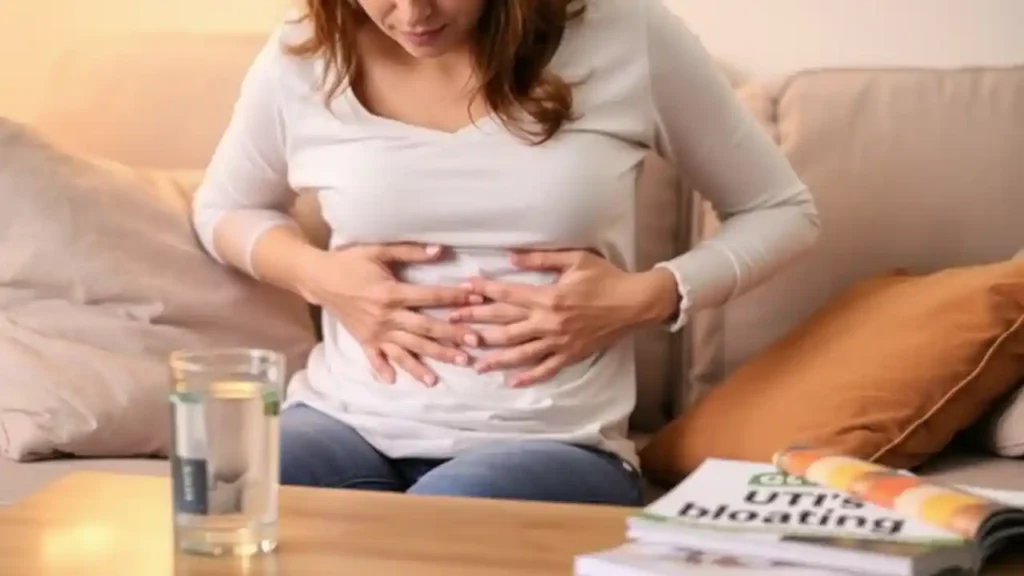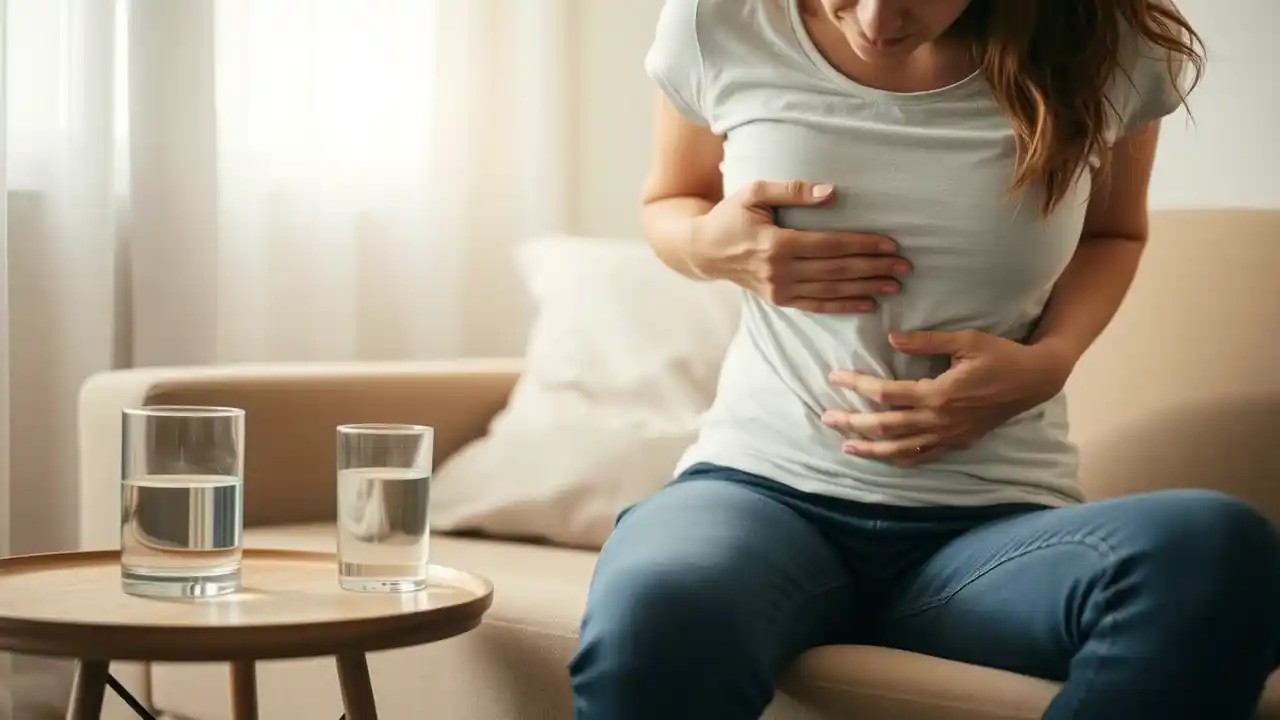That burning sensation when you urinate is bad enough, but now your belly feels like a balloon ready to pop. If you’re experiencing UTI Bloating (UTI), you’re not alone.
This often-overlooked combination of symptoms can make an already uncomfortable condition even more distressing. While most people associate UTIs with urinary symptoms, the connection between these infections and abdominal bloating deserves closer attention.
Contents
What is a UTI?
A urinary tract infection occurs when bacteria, typically E. coli from the digestive tract, invade the urinary system. Think of your urinary tract as a complex plumbing system – when unwanted visitors make themselves at home in these pipes, chaos ensues. While women are more susceptible due to their shorter urethra, anyone can develop a UTI.
The classic symptoms read like a greatest hits album of discomfort: that characteristic burning sensation during urination, an urgent need to dash to the bathroom every few minutes, and pelvic pain that makes you wince.
Some people experience cloudy or strong-smelling urine, while others might notice blood in their urine – a sight that can be particularly alarming. And yes, that uncomfortable bloated feeling you’re experiencing? It might just be another unwelcome member of this symptomatic symphony.
Can a UTI Cause Bloating?
The short answer is yes, but the relationship between UTIs and bloating is more complex than you might think. Picture your lower abdomen as a neighborhood where different organs live side by side.
When infection strikes the urinary tract, it’s like a noisy neighbor disrupting the entire community. The inflammation and irritation from a UTI can create a domino effect, impacting nearby organs and leading to that uncomfortable bloated sensation.
Medical research has shown that the body’s inflammatory response to infection can affect the digestive system, even when the primary infection is in the urinary tract. The proximity of your bladder to your intestines means that inflammation in one area can easily influence the other.
It’s like when your upstairs neighbor’s leaky pipe somehow ends up causing problems in your apartment – systems that seem separate can actually be surprisingly interconnected.

Common Causes of UTI-Related Bloating
Inflammation’s Ripple Effect
When bacteria invade your urinary tract, your body launches its defense mechanism like a well-coordinated military operation. The resulting inflammation can spread beyond the urinary system, affecting surrounding tissues and organs.
This widespread inflammatory response might cause your abdomen to swell and feel tender to the touch. The process is similar to how a small stone dropped in a pond creates ripples that extend far beyond the initial point of impact.
Bacterial Overgrowth: The Unwanted House Guest
The same bacteria causing your UTI might decide to throw a party in your digestive system. This bacterial overgrowth can lead to excess gas production and fluid retention – hello, bloating!
Some research suggests that the antibiotics used to treat UTIs might temporarily disrupt your gut’s natural bacterial balance, potentially exacerbating these symptoms.
Medication Side Effects: The Double-Edged Sword
Speaking of antibiotics, while these medications are essential for fighting UTIs, they sometimes come with their own set of complications.
Antibiotics don’t discriminate between harmful bacteria and the beneficial microorganisms that keep your digestive system running smoothly.
This disruption can lead to bloating, gas, and other gastrointestinal issues. It’s like using a pressure washer to clean your car – effective at removing dirt, but might also strip away some of the protective wax.
Symptoms of UTI and Bloating
When a UTI decides to crash your party, it brings along an uninvited guest list of symptoms. Beyond the typical urinary complaints, you might experience:
- A distended or swollen abdomen that feels tight and uncomfortable
- Increased gas and flatulence that seems to come out of nowhere
- A constant feeling of fullness, even when you haven’t eaten much
- Abdominal pressure that might worsen when you need to urinate
- General discomfort that makes your favorite jeans feel like they’ve shrunk in the wash
These symptoms might vary in intensity throughout the day, often worsening after meals or in the evening. Some people report feeling more bloated when they’re trying to hold their urine – a habit you should avoid when you have a UTI, by the way.
How to Relieve UTI-Related Bloating
Hydration: Your First Line of Defense
Water might seem like a simple solution, but it’s your best friend during a UTI. Drinking plenty of fluids helps flush out bacteria and reduces the concentration of irritants in your urine.
Aim for at least eight 8-ounce glasses of water daily – more if you’re active or live in a warm climate. Think of it as giving your urinary system a gentle but thorough cleanse.
Probiotics: Restoring Balance to Your Internal Ecosystem
If antibiotics have thrown your gut flora into chaos, probiotics can help restore order. Look for supplements containing Lactobacillus and Bifidobacterium strains, or incorporate probiotic-rich foods like yogurt, kefir, and sauerkraut into your diet. Consider these beneficial bacteria your tiny peacekeepers, helping to maintain harmony in your digestive system.
Dietary Adjustments: Strategic Eating for Comfort
While dealing with UTI-related bloating, your food choices matter more than ever. Consider temporarily avoiding:
- Carbonated beverages that can introduce extra gas
- Foods known to cause bloating (beans, lentils, cruciferous vegetables)
- Artificial sweeteners that might ferment in your gut
- Spicy or acidic foods that could irritate your system
Instead, focus on gentle, anti-inflammatory foods like:
- Cucumber and celery for natural diuretic effects
- Ginger or peppermint tea to ease digestive discomfort
- Lean proteins that are easy to digest
- Cooked vegetables rather than raw ones
Over-the-Counter Relief Options
Several OTC medications can help manage bloating while you’re treating the underlying UTI:
- Simethicone products help break up gas bubbles in your digestive tract
- Antacids can provide temporary relief from pressure and discomfort
- Digestive enzymes might help if your bloating worsens after meals
Remember to consult with your healthcare provider before adding any new medications to your treatment regimen, as some might interact with your prescribed antibiotics.
The Comfort of Heat
Sometimes the simplest solutions are the most effective. A warm compress applied to your lower abdomen can help:
- Relax tense muscles
- Improve blood circulation to the area
- Reduce the perception of pain and discomfort
- Provide a sense of comfort during recovery
When to See a Doctor
While it’s tempting to try managing symptoms on your own, certain signs should prompt an immediate call to your healthcare provider:
Red Flags That Demand Attention
- Fever over 101°F (38.3°C)
- Severe back or side pain that might indicate kidney involvement
- Blood in your urine
- Persistent vomiting
- Extreme fatigue or weakness
- Bloating that becomes severely painful or doesn’t improve with home remedies
Remember, untreated UTIs can lead to serious complications, including kidney infections. Don’t let embarrassment or busy schedules prevent you from seeking necessary medical care.
Preventing UTIs and Bloating
Hygiene Habits That Make a Difference
Prevention is always better than cure, and simple hygiene practices can significantly reduce your risk of UTIs:
- Wipe from front to back after using the bathroom
- Urinate before and after sexual activity
- Change out of wet swimsuits or sweaty clothes promptly
- Choose breathable cotton underwear
- Avoid harsh feminine hygiene products
Lifestyle Strategies for Long-term Protection
Your daily choices can create an environment where UTIs are less likely to thrive:
- Stay well-hydrated throughout the day
- Maintain a balanced diet rich in fiber and probiotics
- Exercise regularly to promote healthy circulation
- Consider cranberry supplements (while evidence is mixed, some people find them helpful)
- Manage stress levels, as chronic stress can impact immune function
Regular Check-ups: Your Preventive Maintenance Plan
For those prone to recurrent UTIs, regular medical check-ups can help:
- Identify underlying risk factors
- Monitor for anatomical abnormalities that might increase susceptibility
- Adjust prevention strategies based on individual needs
- Catch infections early when they’re easier to treat
FAQs About UTI and Bloating
Can bloating be the only symptom of a UTI?
While unusual, some people might experience bloating as an early sign of a UTI. However, other symptoms typically develop within a day or two.
If you’re experiencing persistent bloating without other UTI symptoms, consider consulting your healthcare provider to rule out other conditions.
How long does UTI-related bloating last?
Bloating typically improves as the infection responds to antibiotics, usually within 2-3 days of starting treatment.
However, if you’re taking antibiotics, some bloating might persist due to their effects on gut bacteria. This should resolve within a few days after completing your course of antibiotics.
Are there natural remedies for UTI bloating?
Several natural approaches might help manage bloating during a UTI:
- Drinking unsweetened cranberry juice
- Taking D-mannose supplements
- Using essential oils like peppermint or lavender (properly diluted)
- Practicing gentle yoga poses that aid digestion
- Trying herbal teas like chamomile or fennel
However, these should complement, not replace, prescribed medical treatments.
Conclusion
Understanding the connection between UTIs and bloating can help you better manage these uncomfortable symptoms. While dealing with both issues simultaneously might feel overwhelming, remember that UTI relief is possible with the right combination of medical treatment and self-care strategies.
Stay attentive to your body’s signals, maintain open communication with your healthcare provider, and be patient with your healing process.
With proper care and prevention strategies, you can minimize the impact of UTIs and related bloating on your daily life.
Remember, every person’s experience with UTIs and bloating is unique. What works perfectly for one individual might need adjustment for another.
Don’t hesitate to work with your healthcare provider to develop a personalized approach to managing and preventing these conditions. Your comfort and health are worth the effort of finding the right solution for you.


